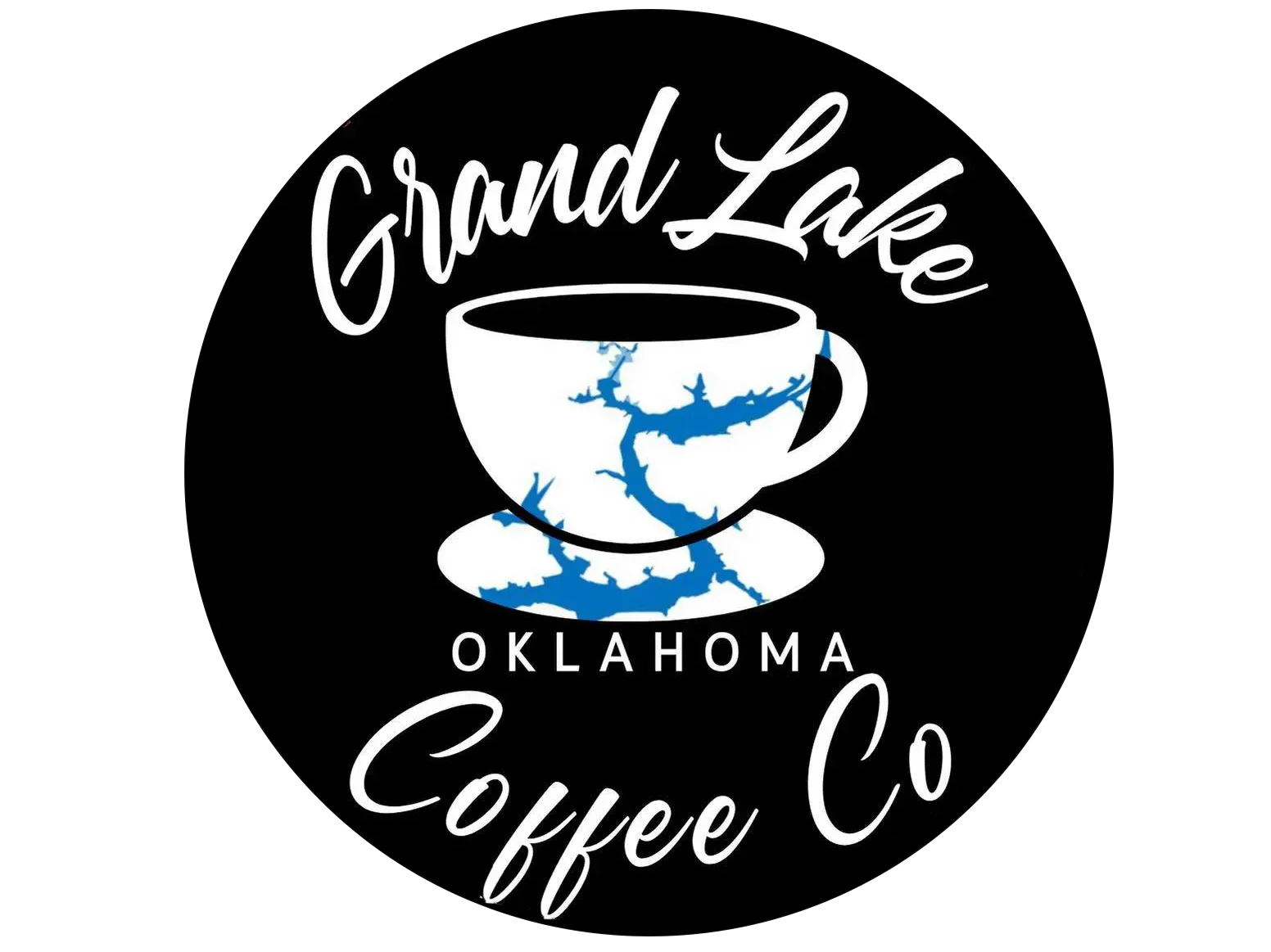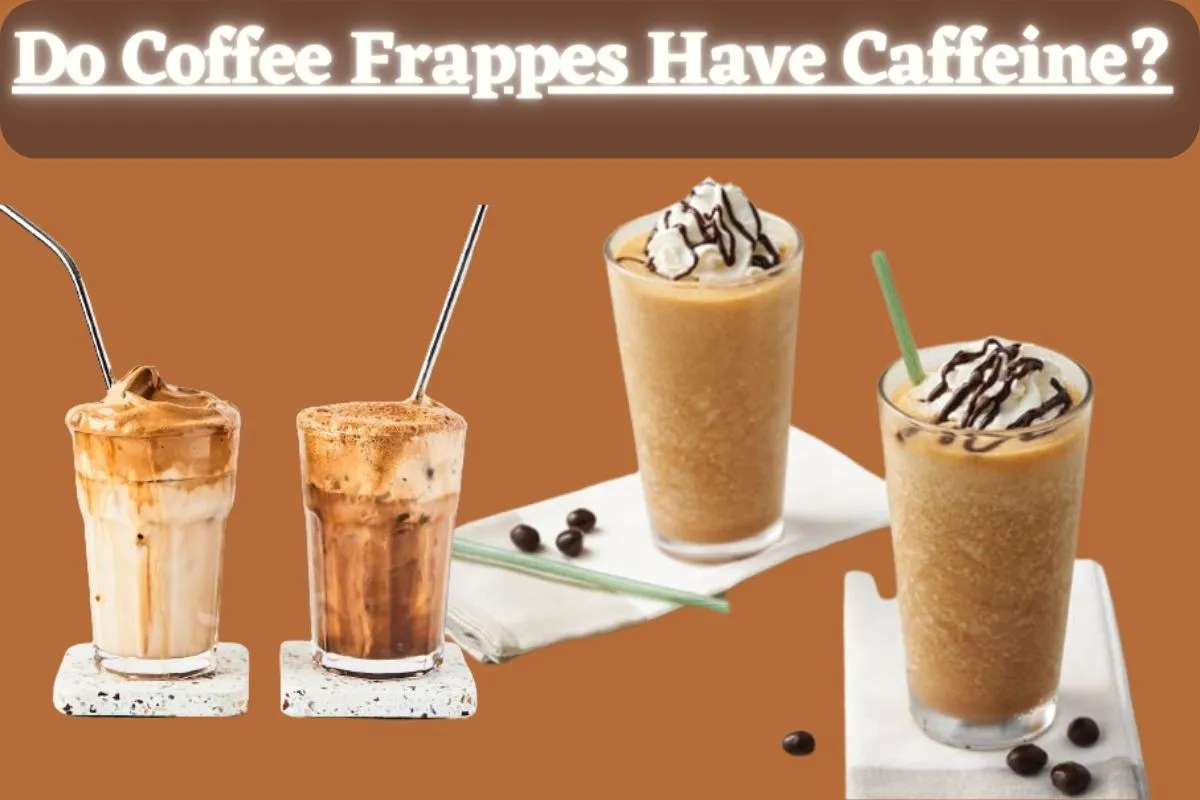Did you know the beloved coffee frappe was born out of necessity? In 1957, when a hot water shortage struck, a clever coffee representative stumbled upon the iconic frothy iced coffee drink.
But does this refreshing treat pack the same caffeinated punch as your morning cup of joe? Let’s dive into the world of coffee frappes and discover if they’ll give you that extra buzz, Do Coffee Frappes Have Caffeine?
Importance of Knowing Caffeine Content in Coffee Frappes
The coffee frappe, a delightful blend of coffee, ice, and often milk or cream, is a popular treat perfect for those warm summer days. Born from an accidental invention in Greece in 1957, the classic frappe is made with instant coffee.
Modern variations, including the trademarked Starbucks Frappuccino, often include espresso, blended ice, and a host of flavored syrups.
While a delicious and refreshing choice, understanding the caffeine content in coffee frappes is important.
Individuals sensitive to caffeine, pregnant or breastfeeding women, and those with certain medical conditions should be mindful of their frappe consumption. Consulting a healthcare professional for personalized guidance is always wise, as caffeine sensitivities and health concerns vary greatly from person to person.
Do Coffee Frappes Have Caffeine?
Yes, coffee frappes have caffeine. Most frappes use coffee as a primary ingredient, whether it’s instant coffee, espresso, or coffee-flavored syrups. Coffee naturally contains caffeine.
To give you an idea, a small McDonald’s frappe might contain around 50-80mg of caffeine, while a Starbucks Frappuccino can have even more. For example, a Grande Caramel Frappuccino from Starbucks contains 95mg of caffeine
The caffeine content can vary significantly depending on:
Type of Coffee
Instant Coffee
Offers a milder caffeine hit compared to concentrated espresso. A frappe made primarily with instant coffee will be on the lower end of the caffeine spectrum.
Espresso
A powerhouse of caffeine! Frappes with espresso as the base, or those including additional espresso shots, will offer a much stronger caffeine kick.
Decaf Coffee
The ideal choice for those who want the flavor of coffee without the buzz. Be sure to ask if decaf options are available.
Amount of Coffee
Think of it as a simple ratio: more coffee equals more caffeine. Pay attention to how much coffee or espresso is used, as it directly impacts the drink’s caffeine level.
Drink Size
A small frappe will generally have less caffeine than a large one. This is simple because the larger drink contains more coffee base.
Other Factors to Consider
Flavored Syrups
While the primary flavors (vanilla, caramel, etc.) are usually caffeine-free, chocolate syrups often have trace amounts of naturally occurring caffeine.
Extra Espresso Shots
This is a surefire way to significantly increase caffeine content.
Whipped Cream
Typically caffeine-free, however, be wary of flavored whipped creams like mocha as they may contain a bit of caffeine.
The Coffee Brand
The specific beans used (Arabica vs. Robusta) and roasting methods can subtly influence caffeine levels.
Barista Technique
While less significant, slight variations in brewing or extraction methods can marginally alter how much caffeine ends up in your drink.
Coffee Frappes Variants and their Caffeine Content
Here are some popular types of coffee frappes:
Mocha Frappe (75 – 150mg caffeine)
A decadent combination of coffee, chocolate syrup, milk, and ice. The caffeine content depends heavily on the coffee base used. A mocha frappe with instant coffee will have less caffeine than one using a double shot of espresso.
Caramel Frappe (75 – 150mg caffeine)
This sweet and creamy treat features coffee, caramel syrup, milk, and ice. Similar to the mocha frappe, consider whether your barista uses instant coffee or espresso for a more accurate idea of caffeine content.
Java Chip Frappe (75 – 150mg caffeine)
Think of this as a mocha frappe with a delightful crunch! Chocolate chips are blended in, adding extra texture and a subtle bitterness that slightly offsets the sweetness. Caffeine levels will mirror those of a classic mocha.
Coffee Frappe (75 – 150mg caffeine)
This is the purist’s choice – coffee, milk, ice, and sometimes a bit of sugar for sweetness. The coffee variety will dictate the caffeine content – frappes made with espresso will be significantly stronger.
Vanilla Bean Crème Frappe (Caffeine-free)
This coffee-free option features a sweet and creamy blend of vanilla, milk, and ice – a perfect treat for those avoiding caffeine.
Strawberries and Crème Frappe (Caffeine-free)
If you’re looking for a refreshing, fruit-forward flavor, this one’s for you! A blend of strawberry flavoring, milk, and ice makes for a delightful caffeine-free choice.
Decaf Frappes (Minimal Caffeine)
Many coffee shops understand caffeine sensitivities and offer decaffeinated versions of their frappes. Opting for decaf coffee substantially minimizes the caffeine content, allowing you to enjoy the flavors guilt-free.
List of Ingredients in Coffee Frappes
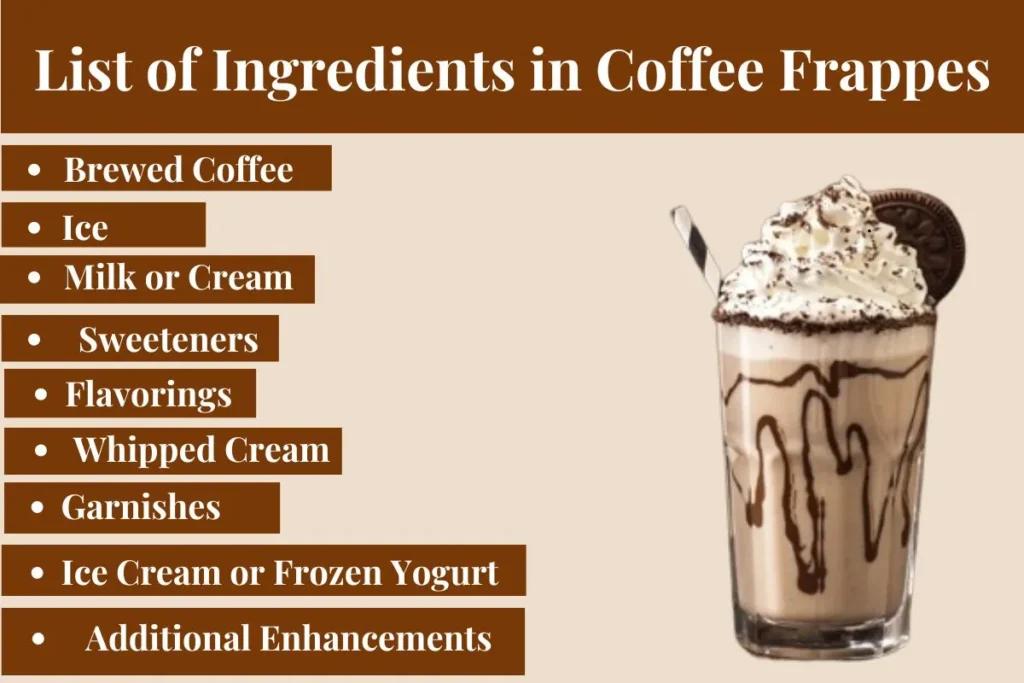
The following is a list of typical components seen in coffee frappes:
- Brewed Coffee: The primary ingredient in coffee frappes is brewed coffee, which provides the rich coffee flavor and caffeine content.
- Ice: Ice is essential for creating the signature frothy and chilled texture of a coffee frappe.
- Milk or Cream: Milk or cream is added to coffee frappes to impart creaminess and richness to the beverage. Dairy milk, non-dairy milk alternatives such as almond milk or soy milk, and heavy cream are commonly used options.
- Sweeteners: Sweeteners such as sugar, syrup, or sweetened condensed milk are often added to coffee frappes to enhance the sweetness and balance the bitterness of the coffee.
- Flavorings: Additional flavorings such as vanilla extract, chocolate syrup, caramel sauce, or flavored syrups may be included to customize the taste of the coffee frappe according to personal preference.
- Whipped Cream: Whipped cream is a popular topping for coffee frappes, adding a creamy and indulgent layer to the beverage.
- Garnishes: Optional garnishes such as chocolate shavings, cocoa powder, cinnamon, or drizzles of syrup may be used to decorate and enhance the presentation of the coffee frappe.
- Ice Cream or Frozen Yogurt: Some variations of coffee frappes may include a scoop of ice cream or frozen yogurt to create a thicker and more desert-like consistency.
- Additional Enhancements: Depending on the recipe or customization options, additional enhancements such as protein powder, flavored extracts, or espresso shots may be added to enhance the flavor and texture of the coffee frappe.
Coffee Frappes Nutritional Information
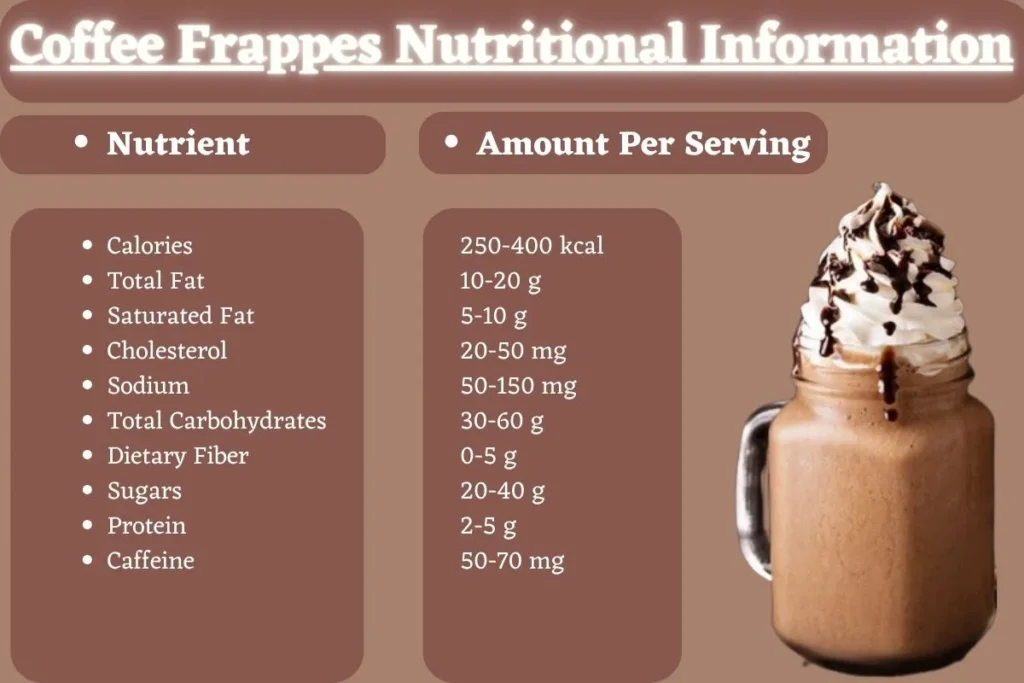
A coffee frappe, while delicious and refreshing, can pack a nutritional punch depending on its size and ingredients. Typically, a serving delivers around 250-400 calories. It contains 10-20 grams of total fat, including 5-10 grams of saturated fat, and 20-50mg of cholesterol.
Sodium content ranges from 50-150mg, while total carbohydrates fall between 30-60 grams with minimal dietary fiber (0-5 grams). Expect around 20-40 grams of sugar and 2-5 grams of protein per serving. Finally, caffeine content is generally around 50-70mg, but this can change significantly if you opt for espresso-based frappes or add extra shots.
| Nutrient | Amount Per Serving |
| Calories | 250-400 kcal |
| Total Fat | 10-20 g |
| Saturated Fat | 5-10 g |
| Cholesterol | 20-50 mg |
| Sodium | 50-150 mg |
| Total Carbohydrates | 30-60 g |
| Dietary Fiber | 0-5 g |
| Sugars | 20-40 g |
| Protein | 2-5 g |
| Caffeine | 50-70 mg |
Alternatives to Coffee Frappes and their Caffeine Content
If you’re looking for alternatives to coffee frappes that might have varying levels of caffeine, there are plenty of options.
Chicory Coffee
A beverage made by brewing roasted chicory root, which offers a taste similar to coffee but is naturally caffeine-free. Chicory coffee can be enjoyed on its own or blended with regular coffee to reduce caffeine intake. It’s known for its earthy and slightly woody flavor, making it a popular coffee substitute, especially in New Orleans style coffee.
Tea Frappes
These can be made with black, green, or herbal teas and offer a wide range of flavors and caffeine levels. Black tea frappes provide a robust flavor and about half the caffeine of a coffee frappe, while green tea frappes offer a more delicate taste and slightly less caffeine. Herbal tea frappes can be caffeine-free and come in a variety of flavors such as mint, chamomile, or hibiscus.
Fruit Juice-Based Frappes
Completely caffeine-free, these frappes are made by blending fruit juices with ice and, optionally, sweeteners or dairy/non-dairy milk. They offer a refreshing and healthful alternative, packed with vitamins and minerals, depending on the fruits used. Popular options include mango, strawberry, and pineapple.
Decaffeinated Coffee Frappes
Made with decaffeinated coffee, these frappes deliver the beloved coffee flavor without the caffeine. The decaffeination process removes at least 97% of the caffeine, making it a great option for those looking to reduce their caffeine intake while still enjoying a coffee-flavored treat.
Nut Milk-Based Frappes
By using almond, soy, coconut, or oat milk, these frappes offer a dairy-free alternative that can be mixed with or without coffee or tea, affecting the caffeine content accordingly. These frappes can be flavored with syrups, spices, or cocoa, providing a versatile base for various flavor profiles.
Herbal Infusions Frappes
Utilizing herbal teas like mint, chamomile, or rooibos, these frappes are caffeine-free and offer a wide range of health benefits, including relaxation and improved digestion. They can be sweetened with honey or sugar and mixed with dairy or non-dairy milk to create a creamy, indulgent drink.
Yerba Mate Frappes
Yerba mate is a traditional South American tea known for its energizing effects, with a caffeine content between that of tea and coffee. Yerba mate frappes offer a unique, slightly bitter flavor and are often enjoyed for their stimulating properties and rich antioxidant content.
Energy Drink Frappes
By combining energy drinks with ice and optional flavorings, these frappes offer a high-caffeine alternative for a significant energy boost. The taste and caffeine content will vary widely depending on the energy drink used, with some offering over 100 mg of caffeine per serving.
Cocoa-Based Frappes
Made with cocoa powder or chocolate syrup, these frappes offer a sweet, chocolaty flavor with a lower caffeine content than coffee-based frappes. Cocoa contains a small amount of caffeine but can also provide a mood boost due to its theobromine content.
Spice-Infused Frappes
Incorporating spices like cinnamon, nutmeg, or cardamom, these frappes can be made with decaffeinated coffee, tea, or milk bases for a flavorful experience without added caffeine. Spices not only enhance the flavor but also offer additional health benefits, including anti-inflammatory properties.
| Beverage | Caffeine Content (mg) |
| Chicory Coffee | 0 |
| Black Tea Frappe | 30-70 |
| Green Tea Frappe | 20-45 |
| Herbal Tea Frappe | 0 |
| Decaffeinated Coffee Frappe | 0-5 |
| Nut Milk-Based Frappe (with coffee/tea) | Variable |
| Nut Milk-Based Frappe (without coffee/tea) | 0 |
| Yerba Mate Frappe | 30-80 |
| Energy Drink Frappe | Variable |
| Cocoa-Based Frappe | 2-20 |
| Spice-Infused Frappe (with decaf coffee/tea) | 0-5 |
| Spice-Infused Frappe (without coffee/tea) | 0 |
Recommended Daily Intake of Coffee Frappes
Coffee frappes, while tasty, can contribute a significant amount to your daily caffeine intake. The recommended daily intake for healthy adults is up to 400mg of caffeine. Coffee frappes typically contain between 50-95mg, even exceeding that depending on size and additions.
A small McDonald’s frappe might represent around 12.5%-20% of your daily limit, while a Starbucks Grande Caramel Frappuccino delivers about 23.75%. Keep in mind that your individual caffeine sensitivity matters, and if you’ve already had other caffeinated drinks, a frappe could easily push you towards or over the recommended daily amount.
Consider opting for smaller frappe sizes, decaf options, or simply be mindful of your total caffeine consumption throughout the day to make the best choice for your body.
Conclusion
While coffee frappes offer a delicious and refreshing way to cool down, it’s crucial to be mindful of their caffeine content. Do Coffee Frappes Have Caffeine? Yes, They have caffeine, and the amount can vary considerably depending on the recipe, size, and additions.
If you’re sensitive to caffeine, have underlying health conditions, or are simply keeping track of your intake, be sure to inquire about the specific caffeine content of your chosen frappe. Opt for smaller sizes, decaf variations, or consider caffeine-free treats when necessary to ensure you’re enjoying your coffee frappe responsibly.
Frequently Asked Questions
Q1. Why is it called a frappe?
The term “frappe” comes from the French word “frappé”, meaning “shaken” or “iced”. This name reflects the traditional method of making frappes, where the ingredients are vigorously shaken with ice to create a frothy texture.
Q2. Does frappe have alcohol?
Traditionally, frappes do not contain alcohol. However, some modern variations may include alcoholic liqueurs for a unique twist. You’ll mostly find these specialty options at bars or certain coffee shops that cater to that style.
Q3. Is frappe sweet or bitter?
Frappes are predominantly sweet due to the added sugar and often flavored syrups. Some varieties, like those with a strong coffee base or the inclusion of dark chocolate, may have a slight bitter edge, but the sweetness generally overpowers it.
Q4. Is frappe without coffee?
The classic Greek frappe is made with instant coffee. However, modern frappes offer a wide range of flavors, including many coffee-free options. Fruit-based frappes with flavors like strawberry and mango are popular caffeine-free choices.
Q5. Does frappe have milk?
Traditionally, some milk (often evaporated milk) was included in Greek frappes. Nowadays, the inclusion of milk varies. Some frappes are made with milk or cream for a richer taste, while others are dairy-free. Always check the ingredients if milk is a concern for you.
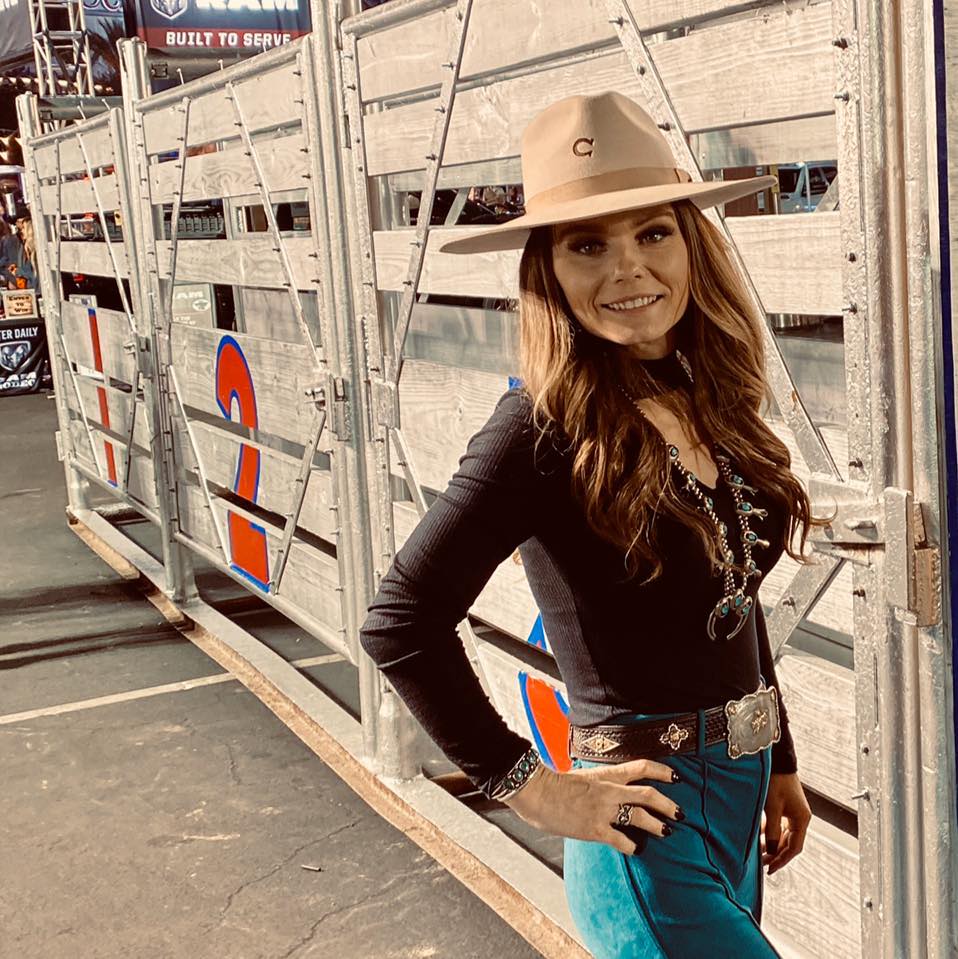
Rossi Glover, the passionate Owner of Grand Lake Coffee, infuses every cup with her love for coffee and dedication to quality. With an extensive background in the art and science of coffee, Rossi is not just a connoisseur but a storyteller, sharing the intricate tales behind each brew.
